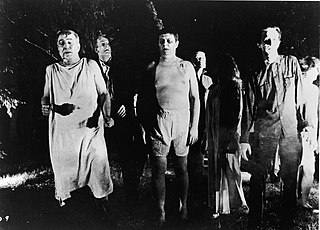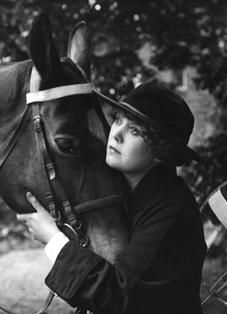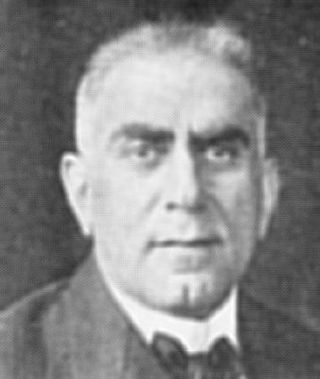Related Research Articles
UFA GmbH, shortened to UFA, is a film and television production company that unites all production activities of the media conglomerate Bertelsmann in Germany. The original UFA was established as Universum-Film Aktiengesellschaft on December 18, 1917, as a direct response to foreign competition in film and propaganda. UFA was founded by a consortium headed by Emil Georg von Stauß, a former Deutsche Bank board member. In March 1927, Alfred Hugenberg, an influential German media entrepreneur and later minister of the economy and minister of agriculture and nutrition in Adolf Hitler's cabinet, purchased UFA and transferred ownership of it to the Nazi Party in 1933.

Anglo-Amalgamated Productions was a British film production company, run by Nat Cohen and Stuart Levy, which operated from 1945 until roughly 1971. Low-budget and second features, often produced at Merton Park Studios, formed much of its output. It was the UK distributor of many films produced by American International Pictures (AIP), who distributed AA's films in the United States.

Film Booking Offices of America (FBO), registered as FBO Pictures Corp., was an American film studio of the silent era, a midsize producer and distributor of mostly low-budget films. The business began in 1918 as Robertson-Cole, an Anglo-American import-export company. Robertson-Cole began distributing films in the United States that December and opened a Los Angeles production facility in 1920. Late that year, R-C entered into a working relationship with East Coast financier Joseph P. Kennedy. A business reorganization in 1922 led to its assumption of the FBO name, first for all its distribution operations and ultimately for its own productions as well. Through Kennedy, the studio contracted with Western leading man Fred Thomson, who grew by 1925 into one of Hollywood's most popular stars. Thomson was just one of several silent screen cowboys with whom FBO became identified.

The B movie, whose roots trace to the silent film era, was a significant contributor to Hollywood's Golden Age of the 1930s and 1940s. As the Hollywood studios made the transition to sound film in the late 1920s, many independent exhibitors began adopting a new programming format: the double feature. The popularity of the twin bill required the production of relatively short, inexpensive movies to occupy the bottom half of the program. The double feature was the predominant presentation model at American theaters throughout the Golden Age, and B movies constituted the majority of Hollywood production during the period.

Johanna "Annie" Bos was a Dutch theater and silent film actress, known as Holland's first movie star and diva.

Maurits Binger was a Dutch film director, producer and screenwriter of the silent era. He directed 39 films between 1913 and 1922 and is considered one of the pioneers of fictional films in the Netherlands. Binger's studio and base of operations was in Haarlem, North Holland. Between 1919 and 1923 he was managing director of Anglo-Hollandia an attempt to break into the larger British market. There is a film institute in the Netherlands in his name. He is sometimes referred to as Maurice Binger.

Guy Newall was a British actor, screenwriter and film director in a career that encompassed the silent era of film-making to the early years of sound films.
Julius Hagen (1884–1940) was a German-born British film producer who produced more than a hundred films in Britain.
Albert Victor Bramble (1884–1963) was an English actor and film director. He began his acting career on the stage. He started acting in films in 1914 and subsequently turned to directing and producing films. He died on 17 May 1963.

Walter Alabaster West was an English film director and producer. He was a partner in the film production company Broadwest Films.

Harold Marvin Shaw was an American stage performer, film actor, screenwriter, and director during the silent era. A native of Tennessee, he worked in theatrical plays and vaudeville for 16 years before he began acting in motion pictures for Edison Studios in New York City in 1910 and then started regularly directing shorts there two years later. Shaw next served briefly as a director for Independent Moving Pictures (IMP) in New York before moving to England in May 1913 to be "chief producer" for the newly established London Film Company. During World War I, he relocated to South Africa, where in 1916 he directed the film De Voortrekkers in cooperation with African Film Productions, Limited. Shaw also established his own production company while in South Africa, completing there two more releases, The Rose of Rhodesia in 1918 and the comedy Thoroughbreds All in 1919. After directing films once again in England under contract with Stoll Pictures, he finally returned to the United States in 1922 and later directed several screen projects for Metro Pictures in California before his death in Los Angeles in 1926. During his 15-year film career, Shaw worked on more than 125 films either as a director, actor, or screenwriter.
Hepworth Picture Plays was a British film production company active during the silent era. Founded in 1897 by the cinema pioneer Cecil Hepworth, it was based at Walton Studios west of London.
The Ideal Film Company was a British film production and distribution company that operated between 1911 and 1934.
The British Actors Film Company was a British film production company that operated between 1916 and 1923 during the Silent era. It involved a consortium of prominent stage actors that included figures such as A.E. Matthews and Leslie Howard. The actors often exchanged their salaries for a share of the profits. Many of its films were made at Bushey Studios to the north of London.

George Clark (1888–1946) was a British film actor and film producer during the silent era. For many years Clark worked with the British star Guy Newall, whom he had met during the First World War. Together they founded Lucky Cat Films and later George Clark Productions, securing a distribution arrangement with the larger Stoll Pictures.
Bernard Edwin Doxat-Pratt was a British film director who worked for Anglo-Hollandia and Granger-Binger.
Astra Films was a British film production and distribution company of the silent era. It was set up in Leeds following the First World War by the film director Herbert Wilcox, his younger brother Charles Wilcox and H.W. Thompson, a leading figure in film distribution in the North of England. After the company's initial success, Wilcox left the firm to set up on his own and rose to become one of the most successful independent producer-directors in the world. After a merger the company released films under the name Astra-National.
Staaken Studios was a film studio located in Staaken on the outskirts of the German capital Berlin. A large former zeppelin hangar, it was converted to film use following the First World War and operated during the Weimar Republic. In July 1923 it was the largest studio in the world, with floor space of around 18,000 square feet. It was used for the construction of massive sets on a series of major productions of the silent era, including I.N.R.I., Metropolis, The Holy Mountain and The Ship of Lost Souls. These epics were a part of the German attempt on world markets during the decade. The 1927 Anglo-German co-production The Ghost Train was shot at Staaken.
Arrow Film Corporation was an American film production and distribution company during the silent era from 1915 to 1926. An independent company it operated alongside the established studios. Originally formed to supply films for Pathé Exchange, the company quickly separated and concentrated on a mixture of medium and low-budget productions. The company was sometimes referred to as Arrow Pictures.

Elsie Coh(e)n was a Dutch-born Polish Jew who became a naturalised Briton in 1925. She worked in film journalism, publicity and sales before managing some of the first art cinemas in the UK. She was most notable for her period in charge of the The Academy cinema in Oxford Street 1931-1940.